Ethical and Legal Analysis of Nursing Student Exam Cheating Case Study
VerifiedAdded on 2021/04/21
|8
|2802
|15
Essay
AI Summary
This essay examines a case study involving a nursing student who intends to cheat on an online exam by obtaining screenshots of the questions beforehand. The essay explores the ethical, legal, and professional implications of this action, referencing the Australian Registered Nurses Standards for Practice, the Nursing and Midwifery Board code of conducts, and the ICN Code of Ethics for Nurses. It discusses the immediate and subsequent actions to be taken, including denying the action, addressing the impact of the behavior, and emphasizing the importance of ethics, law, and professional character. The essay highlights how the student's actions violate several standards of practice, including critical thinking, professional relationships, maintaining capability, and providing safe, responsive care. It also details the violation of various codes of ethics and professional conduct. The potential legal consequences for the student are also explored, including examination cancellation or expulsion, as well as the broader implications for the healthcare sector and the production of competent nurses. The essay concludes by emphasizing the importance of upholding ethical standards in nursing to safeguard patient well-being and maintain public trust.
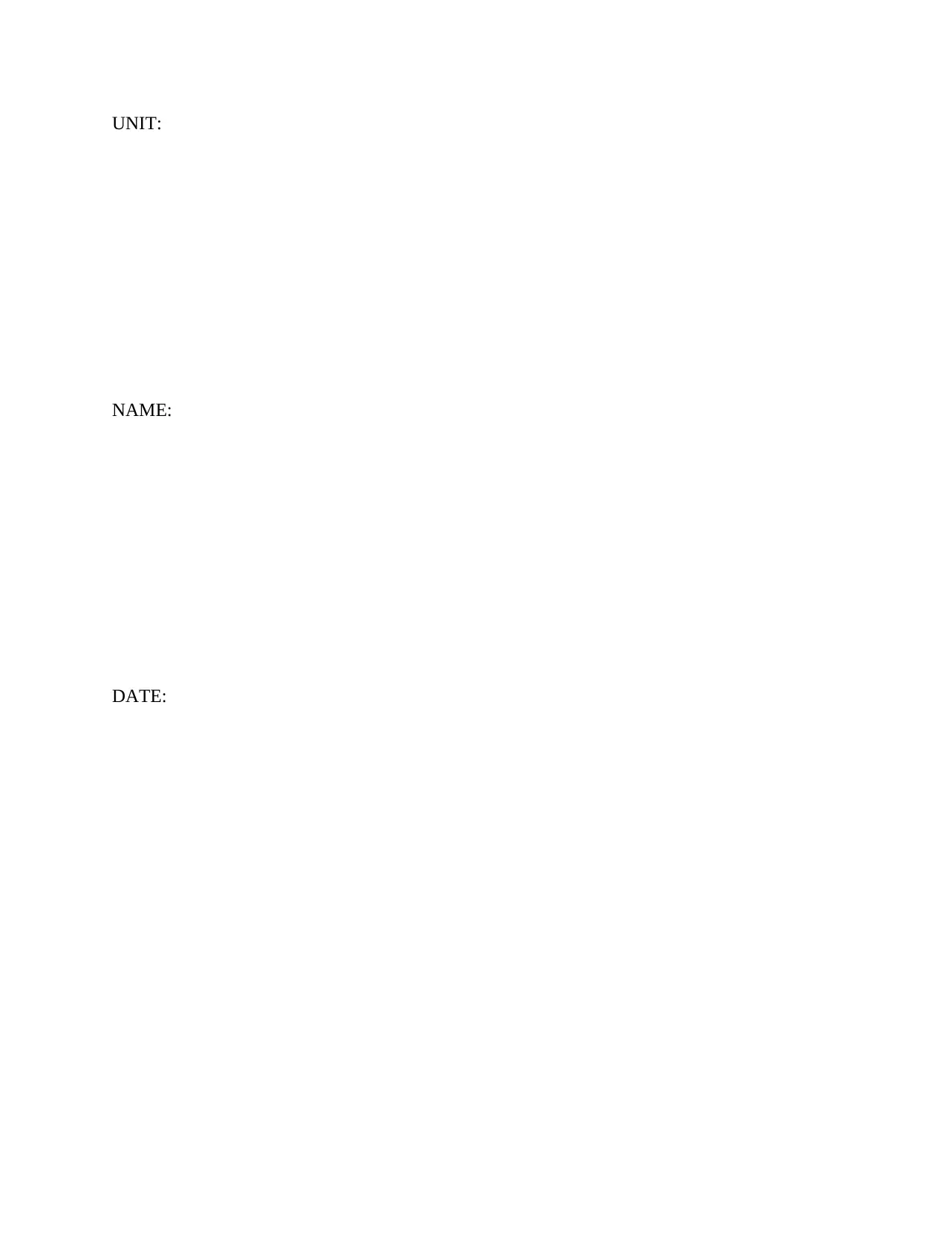
UNIT:
NAME:
DATE:
NAME:
DATE:
Paraphrase This Document
Need a fresh take? Get an instant paraphrase of this document with our AI Paraphraser
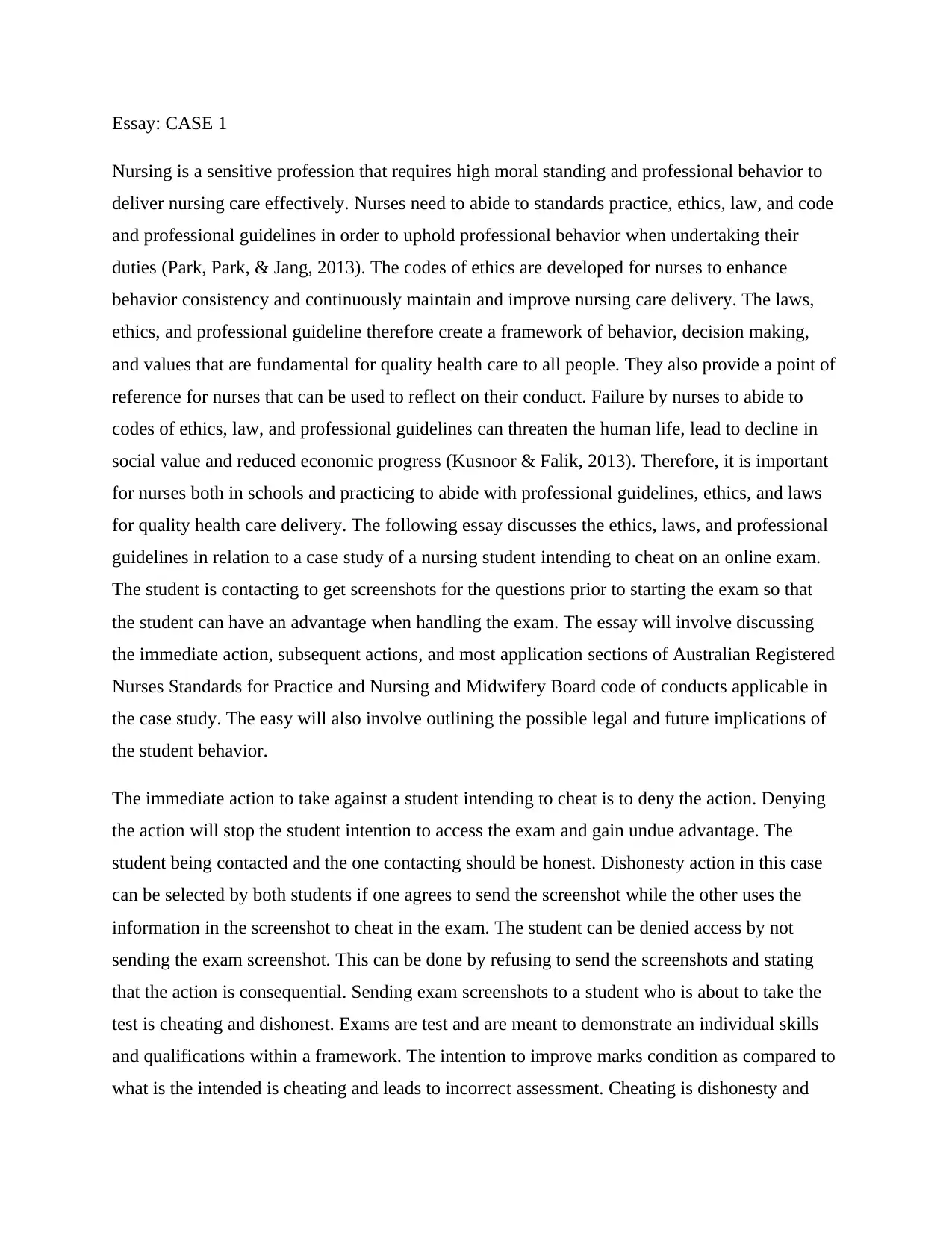
Essay: CASE 1
Nursing is a sensitive profession that requires high moral standing and professional behavior to
deliver nursing care effectively. Nurses need to abide to standards practice, ethics, law, and code
and professional guidelines in order to uphold professional behavior when undertaking their
duties (Park, Park, & Jang, 2013). The codes of ethics are developed for nurses to enhance
behavior consistency and continuously maintain and improve nursing care delivery. The laws,
ethics, and professional guideline therefore create a framework of behavior, decision making,
and values that are fundamental for quality health care to all people. They also provide a point of
reference for nurses that can be used to reflect on their conduct. Failure by nurses to abide to
codes of ethics, law, and professional guidelines can threaten the human life, lead to decline in
social value and reduced economic progress (Kusnoor & Falik, 2013). Therefore, it is important
for nurses both in schools and practicing to abide with professional guidelines, ethics, and laws
for quality health care delivery. The following essay discusses the ethics, laws, and professional
guidelines in relation to a case study of a nursing student intending to cheat on an online exam.
The student is contacting to get screenshots for the questions prior to starting the exam so that
the student can have an advantage when handling the exam. The essay will involve discussing
the immediate action, subsequent actions, and most application sections of Australian Registered
Nurses Standards for Practice and Nursing and Midwifery Board code of conducts applicable in
the case study. The easy will also involve outlining the possible legal and future implications of
the student behavior.
The immediate action to take against a student intending to cheat is to deny the action. Denying
the action will stop the student intention to access the exam and gain undue advantage. The
student being contacted and the one contacting should be honest. Dishonesty action in this case
can be selected by both students if one agrees to send the screenshot while the other uses the
information in the screenshot to cheat in the exam. The student can be denied access by not
sending the exam screenshot. This can be done by refusing to send the screenshots and stating
that the action is consequential. Sending exam screenshots to a student who is about to take the
test is cheating and dishonest. Exams are test and are meant to demonstrate an individual skills
and qualifications within a framework. The intention to improve marks condition as compared to
what is the intended is cheating and leads to incorrect assessment. Cheating is dishonesty and
Nursing is a sensitive profession that requires high moral standing and professional behavior to
deliver nursing care effectively. Nurses need to abide to standards practice, ethics, law, and code
and professional guidelines in order to uphold professional behavior when undertaking their
duties (Park, Park, & Jang, 2013). The codes of ethics are developed for nurses to enhance
behavior consistency and continuously maintain and improve nursing care delivery. The laws,
ethics, and professional guideline therefore create a framework of behavior, decision making,
and values that are fundamental for quality health care to all people. They also provide a point of
reference for nurses that can be used to reflect on their conduct. Failure by nurses to abide to
codes of ethics, law, and professional guidelines can threaten the human life, lead to decline in
social value and reduced economic progress (Kusnoor & Falik, 2013). Therefore, it is important
for nurses both in schools and practicing to abide with professional guidelines, ethics, and laws
for quality health care delivery. The following essay discusses the ethics, laws, and professional
guidelines in relation to a case study of a nursing student intending to cheat on an online exam.
The student is contacting to get screenshots for the questions prior to starting the exam so that
the student can have an advantage when handling the exam. The essay will involve discussing
the immediate action, subsequent actions, and most application sections of Australian Registered
Nurses Standards for Practice and Nursing and Midwifery Board code of conducts applicable in
the case study. The easy will also involve outlining the possible legal and future implications of
the student behavior.
The immediate action to take against a student intending to cheat is to deny the action. Denying
the action will stop the student intention to access the exam and gain undue advantage. The
student being contacted and the one contacting should be honest. Dishonesty action in this case
can be selected by both students if one agrees to send the screenshot while the other uses the
information in the screenshot to cheat in the exam. The student can be denied access by not
sending the exam screenshot. This can be done by refusing to send the screenshots and stating
that the action is consequential. Sending exam screenshots to a student who is about to take the
test is cheating and dishonest. Exams are test and are meant to demonstrate an individual skills
and qualifications within a framework. The intention to improve marks condition as compared to
what is the intended is cheating and leads to incorrect assessment. Cheating is dishonesty and
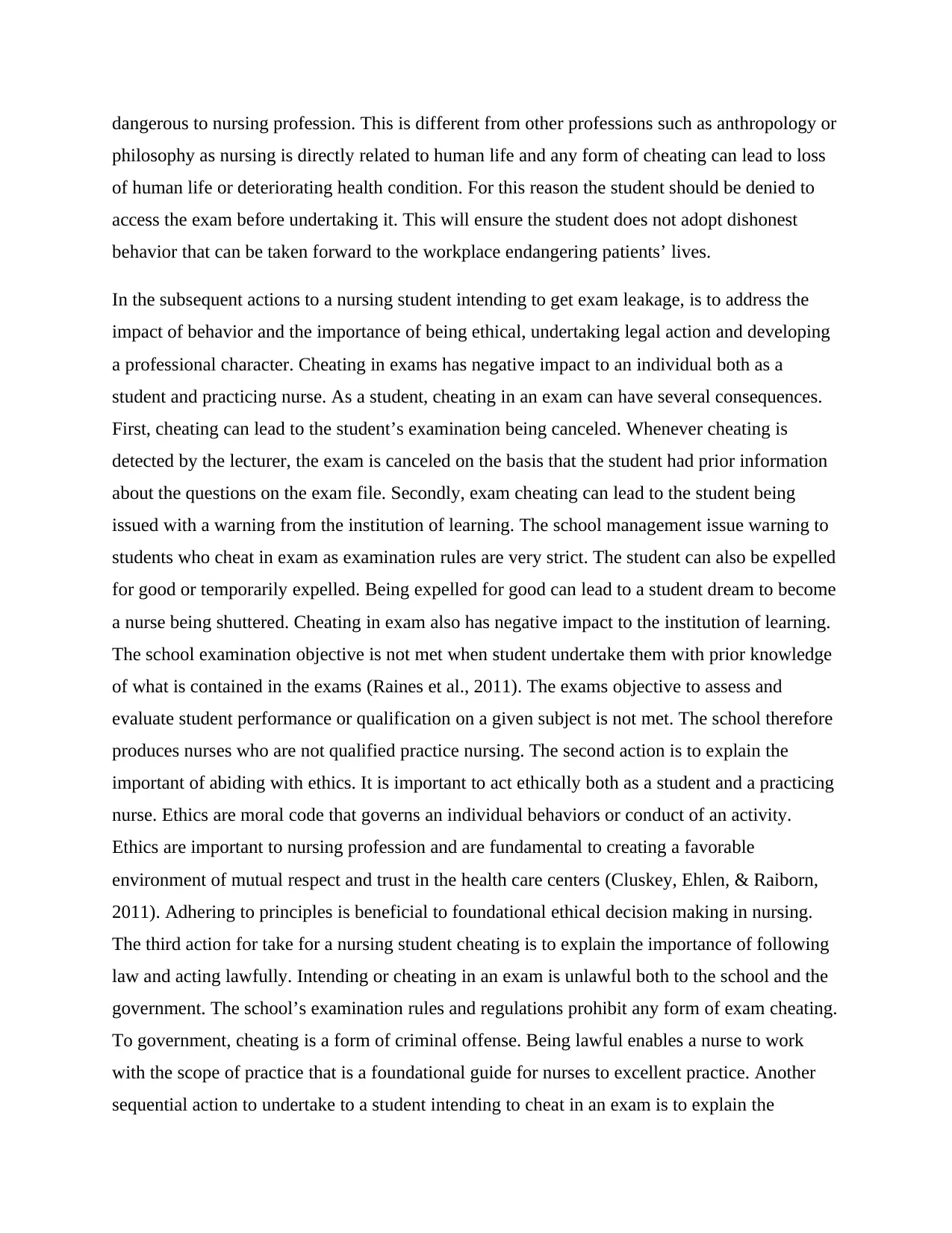
dangerous to nursing profession. This is different from other professions such as anthropology or
philosophy as nursing is directly related to human life and any form of cheating can lead to loss
of human life or deteriorating health condition. For this reason the student should be denied to
access the exam before undertaking it. This will ensure the student does not adopt dishonest
behavior that can be taken forward to the workplace endangering patients’ lives.
In the subsequent actions to a nursing student intending to get exam leakage, is to address the
impact of behavior and the importance of being ethical, undertaking legal action and developing
a professional character. Cheating in exams has negative impact to an individual both as a
student and practicing nurse. As a student, cheating in an exam can have several consequences.
First, cheating can lead to the student’s examination being canceled. Whenever cheating is
detected by the lecturer, the exam is canceled on the basis that the student had prior information
about the questions on the exam file. Secondly, exam cheating can lead to the student being
issued with a warning from the institution of learning. The school management issue warning to
students who cheat in exam as examination rules are very strict. The student can also be expelled
for good or temporarily expelled. Being expelled for good can lead to a student dream to become
a nurse being shuttered. Cheating in exam also has negative impact to the institution of learning.
The school examination objective is not met when student undertake them with prior knowledge
of what is contained in the exams (Raines et al., 2011). The exams objective to assess and
evaluate student performance or qualification on a given subject is not met. The school therefore
produces nurses who are not qualified practice nursing. The second action is to explain the
important of abiding with ethics. It is important to act ethically both as a student and a practicing
nurse. Ethics are moral code that governs an individual behaviors or conduct of an activity.
Ethics are important to nursing profession and are fundamental to creating a favorable
environment of mutual respect and trust in the health care centers (Cluskey, Ehlen, & Raiborn,
2011). Adhering to principles is beneficial to foundational ethical decision making in nursing.
The third action for take for a nursing student cheating is to explain the importance of following
law and acting lawfully. Intending or cheating in an exam is unlawful both to the school and the
government. The school’s examination rules and regulations prohibit any form of exam cheating.
To government, cheating is a form of criminal offense. Being lawful enables a nurse to work
with the scope of practice that is a foundational guide for nurses to excellent practice. Another
sequential action to undertake to a student intending to cheat in an exam is to explain the
philosophy as nursing is directly related to human life and any form of cheating can lead to loss
of human life or deteriorating health condition. For this reason the student should be denied to
access the exam before undertaking it. This will ensure the student does not adopt dishonest
behavior that can be taken forward to the workplace endangering patients’ lives.
In the subsequent actions to a nursing student intending to get exam leakage, is to address the
impact of behavior and the importance of being ethical, undertaking legal action and developing
a professional character. Cheating in exams has negative impact to an individual both as a
student and practicing nurse. As a student, cheating in an exam can have several consequences.
First, cheating can lead to the student’s examination being canceled. Whenever cheating is
detected by the lecturer, the exam is canceled on the basis that the student had prior information
about the questions on the exam file. Secondly, exam cheating can lead to the student being
issued with a warning from the institution of learning. The school management issue warning to
students who cheat in exam as examination rules are very strict. The student can also be expelled
for good or temporarily expelled. Being expelled for good can lead to a student dream to become
a nurse being shuttered. Cheating in exam also has negative impact to the institution of learning.
The school examination objective is not met when student undertake them with prior knowledge
of what is contained in the exams (Raines et al., 2011). The exams objective to assess and
evaluate student performance or qualification on a given subject is not met. The school therefore
produces nurses who are not qualified practice nursing. The second action is to explain the
important of abiding with ethics. It is important to act ethically both as a student and a practicing
nurse. Ethics are moral code that governs an individual behaviors or conduct of an activity.
Ethics are important to nursing profession and are fundamental to creating a favorable
environment of mutual respect and trust in the health care centers (Cluskey, Ehlen, & Raiborn,
2011). Adhering to principles is beneficial to foundational ethical decision making in nursing.
The third action for take for a nursing student cheating is to explain the importance of following
law and acting lawfully. Intending or cheating in an exam is unlawful both to the school and the
government. The school’s examination rules and regulations prohibit any form of exam cheating.
To government, cheating is a form of criminal offense. Being lawful enables a nurse to work
with the scope of practice that is a foundational guide for nurses to excellent practice. Another
sequential action to undertake to a student intending to cheat in an exam is to explain the
⊘ This is a preview!⊘
Do you want full access?
Subscribe today to unlock all pages.

Trusted by 1+ million students worldwide
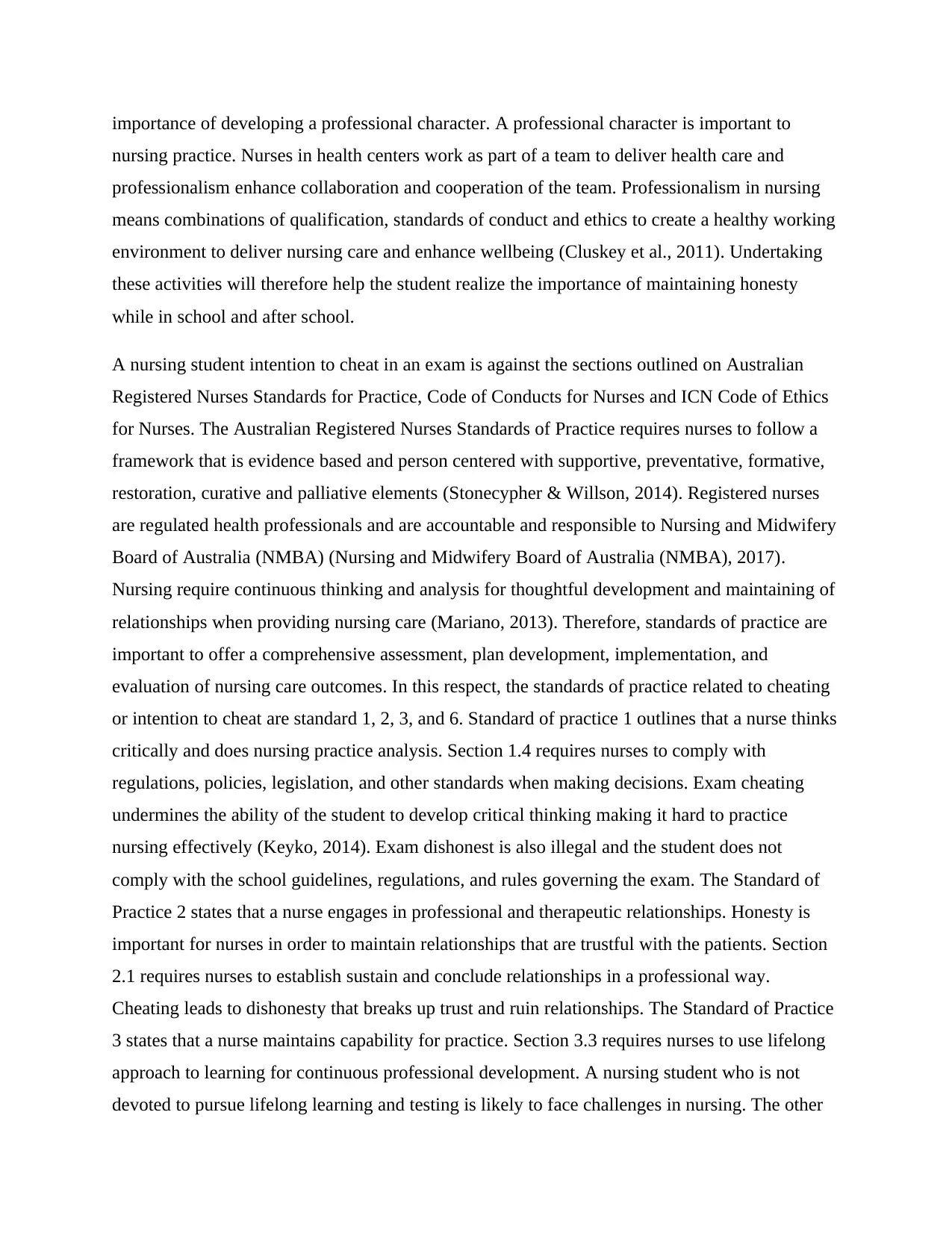
importance of developing a professional character. A professional character is important to
nursing practice. Nurses in health centers work as part of a team to deliver health care and
professionalism enhance collaboration and cooperation of the team. Professionalism in nursing
means combinations of qualification, standards of conduct and ethics to create a healthy working
environment to deliver nursing care and enhance wellbeing (Cluskey et al., 2011). Undertaking
these activities will therefore help the student realize the importance of maintaining honesty
while in school and after school.
A nursing student intention to cheat in an exam is against the sections outlined on Australian
Registered Nurses Standards for Practice, Code of Conducts for Nurses and ICN Code of Ethics
for Nurses. The Australian Registered Nurses Standards of Practice requires nurses to follow a
framework that is evidence based and person centered with supportive, preventative, formative,
restoration, curative and palliative elements (Stonecypher & Willson, 2014). Registered nurses
are regulated health professionals and are accountable and responsible to Nursing and Midwifery
Board of Australia (NMBA) (Nursing and Midwifery Board of Australia (NMBA), 2017).
Nursing require continuous thinking and analysis for thoughtful development and maintaining of
relationships when providing nursing care (Mariano, 2013). Therefore, standards of practice are
important to offer a comprehensive assessment, plan development, implementation, and
evaluation of nursing care outcomes. In this respect, the standards of practice related to cheating
or intention to cheat are standard 1, 2, 3, and 6. Standard of practice 1 outlines that a nurse thinks
critically and does nursing practice analysis. Section 1.4 requires nurses to comply with
regulations, policies, legislation, and other standards when making decisions. Exam cheating
undermines the ability of the student to develop critical thinking making it hard to practice
nursing effectively (Keyko, 2014). Exam dishonest is also illegal and the student does not
comply with the school guidelines, regulations, and rules governing the exam. The Standard of
Practice 2 states that a nurse engages in professional and therapeutic relationships. Honesty is
important for nurses in order to maintain relationships that are trustful with the patients. Section
2.1 requires nurses to establish sustain and conclude relationships in a professional way.
Cheating leads to dishonesty that breaks up trust and ruin relationships. The Standard of Practice
3 states that a nurse maintains capability for practice. Section 3.3 requires nurses to use lifelong
approach to learning for continuous professional development. A nursing student who is not
devoted to pursue lifelong learning and testing is likely to face challenges in nursing. The other
nursing practice. Nurses in health centers work as part of a team to deliver health care and
professionalism enhance collaboration and cooperation of the team. Professionalism in nursing
means combinations of qualification, standards of conduct and ethics to create a healthy working
environment to deliver nursing care and enhance wellbeing (Cluskey et al., 2011). Undertaking
these activities will therefore help the student realize the importance of maintaining honesty
while in school and after school.
A nursing student intention to cheat in an exam is against the sections outlined on Australian
Registered Nurses Standards for Practice, Code of Conducts for Nurses and ICN Code of Ethics
for Nurses. The Australian Registered Nurses Standards of Practice requires nurses to follow a
framework that is evidence based and person centered with supportive, preventative, formative,
restoration, curative and palliative elements (Stonecypher & Willson, 2014). Registered nurses
are regulated health professionals and are accountable and responsible to Nursing and Midwifery
Board of Australia (NMBA) (Nursing and Midwifery Board of Australia (NMBA), 2017).
Nursing require continuous thinking and analysis for thoughtful development and maintaining of
relationships when providing nursing care (Mariano, 2013). Therefore, standards of practice are
important to offer a comprehensive assessment, plan development, implementation, and
evaluation of nursing care outcomes. In this respect, the standards of practice related to cheating
or intention to cheat are standard 1, 2, 3, and 6. Standard of practice 1 outlines that a nurse thinks
critically and does nursing practice analysis. Section 1.4 requires nurses to comply with
regulations, policies, legislation, and other standards when making decisions. Exam cheating
undermines the ability of the student to develop critical thinking making it hard to practice
nursing effectively (Keyko, 2014). Exam dishonest is also illegal and the student does not
comply with the school guidelines, regulations, and rules governing the exam. The Standard of
Practice 2 states that a nurse engages in professional and therapeutic relationships. Honesty is
important for nurses in order to maintain relationships that are trustful with the patients. Section
2.1 requires nurses to establish sustain and conclude relationships in a professional way.
Cheating leads to dishonesty that breaks up trust and ruin relationships. The Standard of Practice
3 states that a nurse maintains capability for practice. Section 3.3 requires nurses to use lifelong
approach to learning for continuous professional development. A nursing student who is not
devoted to pursue lifelong learning and testing is likely to face challenges in nursing. The other
Paraphrase This Document
Need a fresh take? Get an instant paraphrase of this document with our AI Paraphraser
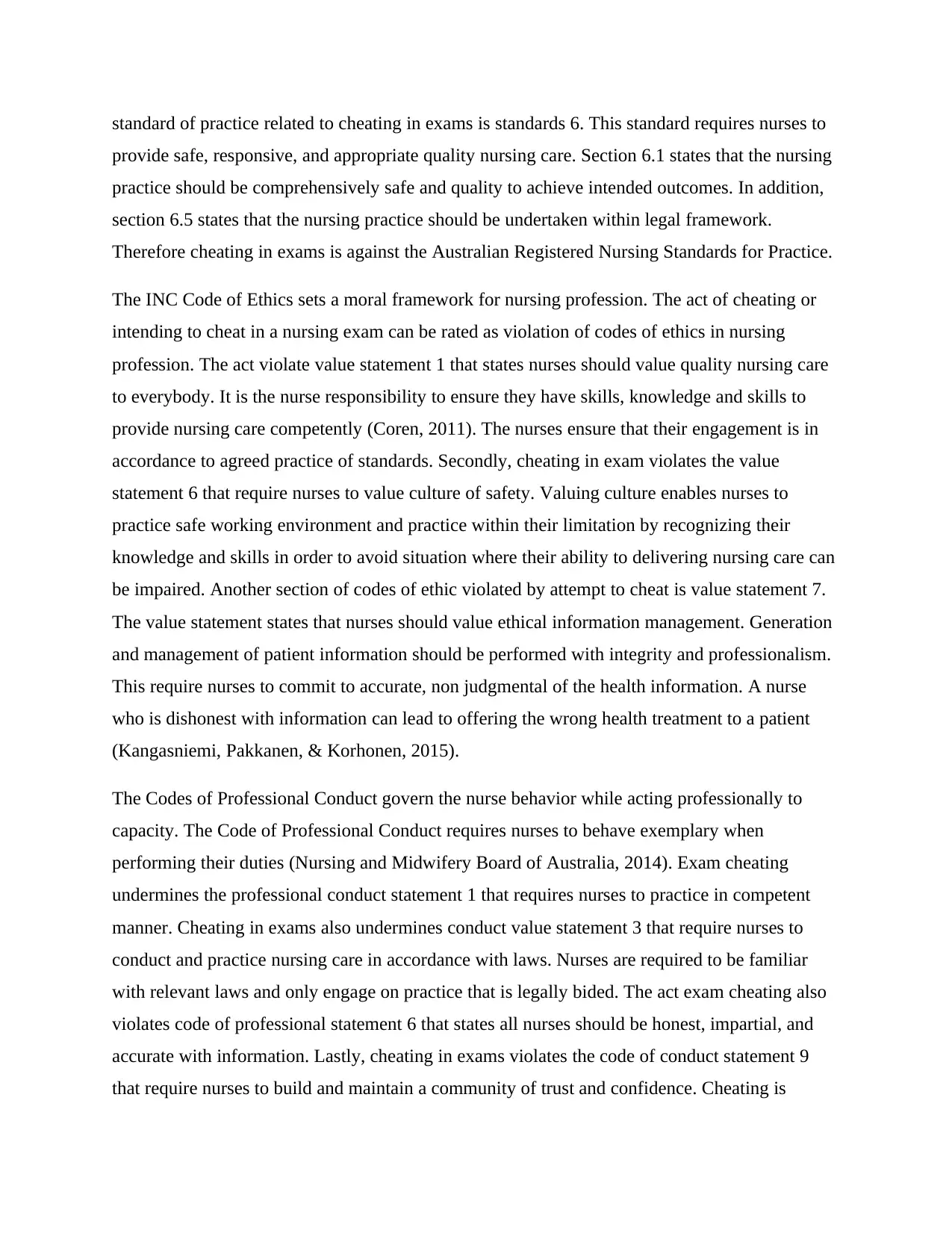
standard of practice related to cheating in exams is standards 6. This standard requires nurses to
provide safe, responsive, and appropriate quality nursing care. Section 6.1 states that the nursing
practice should be comprehensively safe and quality to achieve intended outcomes. In addition,
section 6.5 states that the nursing practice should be undertaken within legal framework.
Therefore cheating in exams is against the Australian Registered Nursing Standards for Practice.
The INC Code of Ethics sets a moral framework for nursing profession. The act of cheating or
intending to cheat in a nursing exam can be rated as violation of codes of ethics in nursing
profession. The act violate value statement 1 that states nurses should value quality nursing care
to everybody. It is the nurse responsibility to ensure they have skills, knowledge and skills to
provide nursing care competently (Coren, 2011). The nurses ensure that their engagement is in
accordance to agreed practice of standards. Secondly, cheating in exam violates the value
statement 6 that require nurses to value culture of safety. Valuing culture enables nurses to
practice safe working environment and practice within their limitation by recognizing their
knowledge and skills in order to avoid situation where their ability to delivering nursing care can
be impaired. Another section of codes of ethic violated by attempt to cheat is value statement 7.
The value statement states that nurses should value ethical information management. Generation
and management of patient information should be performed with integrity and professionalism.
This require nurses to commit to accurate, non judgmental of the health information. A nurse
who is dishonest with information can lead to offering the wrong health treatment to a patient
(Kangasniemi, Pakkanen, & Korhonen, 2015).
The Codes of Professional Conduct govern the nurse behavior while acting professionally to
capacity. The Code of Professional Conduct requires nurses to behave exemplary when
performing their duties (Nursing and Midwifery Board of Australia, 2014). Exam cheating
undermines the professional conduct statement 1 that requires nurses to practice in competent
manner. Cheating in exams also undermines conduct value statement 3 that require nurses to
conduct and practice nursing care in accordance with laws. Nurses are required to be familiar
with relevant laws and only engage on practice that is legally bided. The act exam cheating also
violates code of professional statement 6 that states all nurses should be honest, impartial, and
accurate with information. Lastly, cheating in exams violates the code of conduct statement 9
that require nurses to build and maintain a community of trust and confidence. Cheating is
provide safe, responsive, and appropriate quality nursing care. Section 6.1 states that the nursing
practice should be comprehensively safe and quality to achieve intended outcomes. In addition,
section 6.5 states that the nursing practice should be undertaken within legal framework.
Therefore cheating in exams is against the Australian Registered Nursing Standards for Practice.
The INC Code of Ethics sets a moral framework for nursing profession. The act of cheating or
intending to cheat in a nursing exam can be rated as violation of codes of ethics in nursing
profession. The act violate value statement 1 that states nurses should value quality nursing care
to everybody. It is the nurse responsibility to ensure they have skills, knowledge and skills to
provide nursing care competently (Coren, 2011). The nurses ensure that their engagement is in
accordance to agreed practice of standards. Secondly, cheating in exam violates the value
statement 6 that require nurses to value culture of safety. Valuing culture enables nurses to
practice safe working environment and practice within their limitation by recognizing their
knowledge and skills in order to avoid situation where their ability to delivering nursing care can
be impaired. Another section of codes of ethic violated by attempt to cheat is value statement 7.
The value statement states that nurses should value ethical information management. Generation
and management of patient information should be performed with integrity and professionalism.
This require nurses to commit to accurate, non judgmental of the health information. A nurse
who is dishonest with information can lead to offering the wrong health treatment to a patient
(Kangasniemi, Pakkanen, & Korhonen, 2015).
The Codes of Professional Conduct govern the nurse behavior while acting professionally to
capacity. The Code of Professional Conduct requires nurses to behave exemplary when
performing their duties (Nursing and Midwifery Board of Australia, 2014). Exam cheating
undermines the professional conduct statement 1 that requires nurses to practice in competent
manner. Cheating in exams also undermines conduct value statement 3 that require nurses to
conduct and practice nursing care in accordance with laws. Nurses are required to be familiar
with relevant laws and only engage on practice that is legally bided. The act exam cheating also
violates code of professional statement 6 that states all nurses should be honest, impartial, and
accurate with information. Lastly, cheating in exams violates the code of conduct statement 9
that require nurses to build and maintain a community of trust and confidence. Cheating is
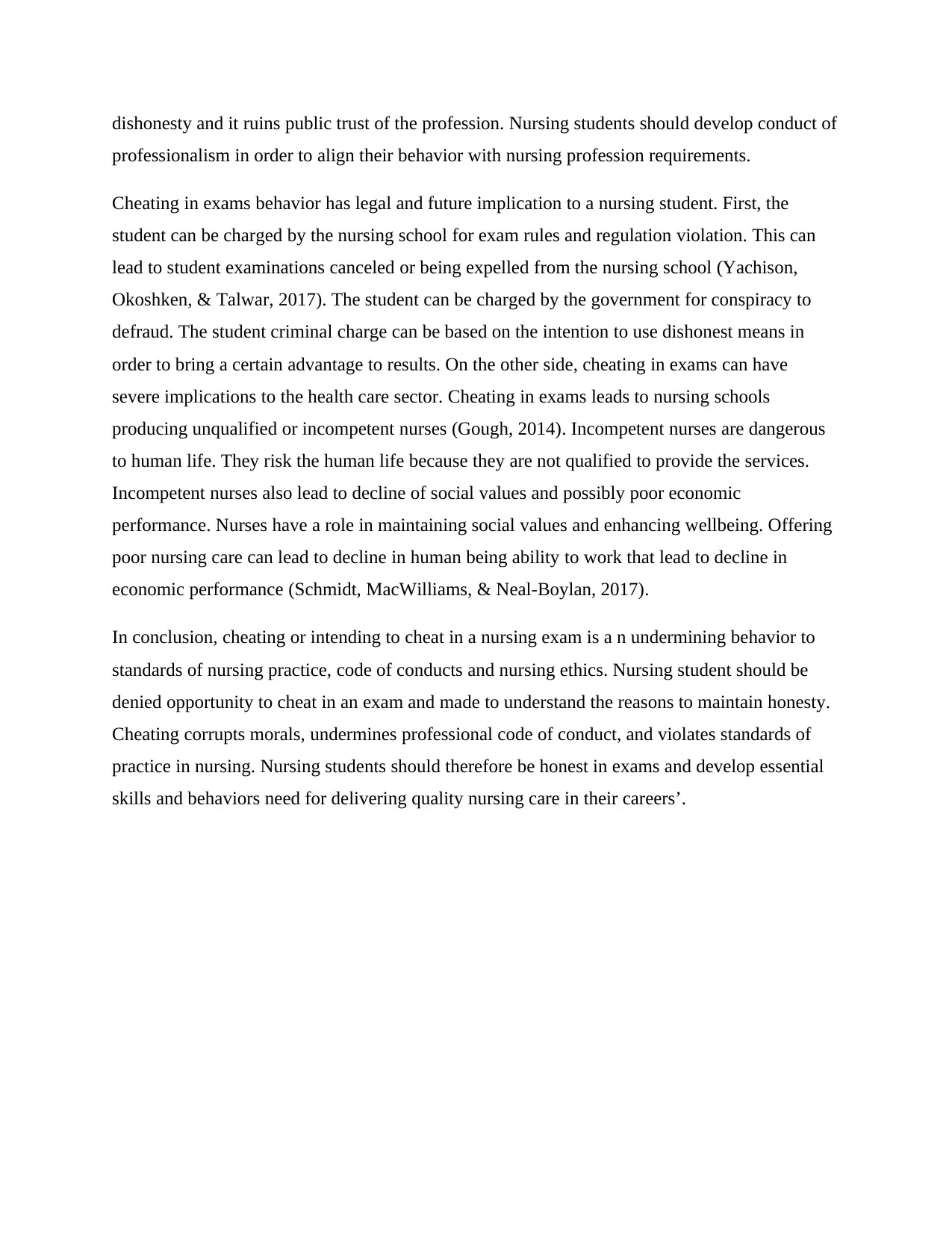
dishonesty and it ruins public trust of the profession. Nursing students should develop conduct of
professionalism in order to align their behavior with nursing profession requirements.
Cheating in exams behavior has legal and future implication to a nursing student. First, the
student can be charged by the nursing school for exam rules and regulation violation. This can
lead to student examinations canceled or being expelled from the nursing school (Yachison,
Okoshken, & Talwar, 2017). The student can be charged by the government for conspiracy to
defraud. The student criminal charge can be based on the intention to use dishonest means in
order to bring a certain advantage to results. On the other side, cheating in exams can have
severe implications to the health care sector. Cheating in exams leads to nursing schools
producing unqualified or incompetent nurses (Gough, 2014). Incompetent nurses are dangerous
to human life. They risk the human life because they are not qualified to provide the services.
Incompetent nurses also lead to decline of social values and possibly poor economic
performance. Nurses have a role in maintaining social values and enhancing wellbeing. Offering
poor nursing care can lead to decline in human being ability to work that lead to decline in
economic performance (Schmidt, MacWilliams, & Neal-Boylan, 2017).
In conclusion, cheating or intending to cheat in a nursing exam is a n undermining behavior to
standards of nursing practice, code of conducts and nursing ethics. Nursing student should be
denied opportunity to cheat in an exam and made to understand the reasons to maintain honesty.
Cheating corrupts morals, undermines professional code of conduct, and violates standards of
practice in nursing. Nursing students should therefore be honest in exams and develop essential
skills and behaviors need for delivering quality nursing care in their careers’.
professionalism in order to align their behavior with nursing profession requirements.
Cheating in exams behavior has legal and future implication to a nursing student. First, the
student can be charged by the nursing school for exam rules and regulation violation. This can
lead to student examinations canceled or being expelled from the nursing school (Yachison,
Okoshken, & Talwar, 2017). The student can be charged by the government for conspiracy to
defraud. The student criminal charge can be based on the intention to use dishonest means in
order to bring a certain advantage to results. On the other side, cheating in exams can have
severe implications to the health care sector. Cheating in exams leads to nursing schools
producing unqualified or incompetent nurses (Gough, 2014). Incompetent nurses are dangerous
to human life. They risk the human life because they are not qualified to provide the services.
Incompetent nurses also lead to decline of social values and possibly poor economic
performance. Nurses have a role in maintaining social values and enhancing wellbeing. Offering
poor nursing care can lead to decline in human being ability to work that lead to decline in
economic performance (Schmidt, MacWilliams, & Neal-Boylan, 2017).
In conclusion, cheating or intending to cheat in a nursing exam is a n undermining behavior to
standards of nursing practice, code of conducts and nursing ethics. Nursing student should be
denied opportunity to cheat in an exam and made to understand the reasons to maintain honesty.
Cheating corrupts morals, undermines professional code of conduct, and violates standards of
practice in nursing. Nursing students should therefore be honest in exams and develop essential
skills and behaviors need for delivering quality nursing care in their careers’.
⊘ This is a preview!⊘
Do you want full access?
Subscribe today to unlock all pages.

Trusted by 1+ million students worldwide
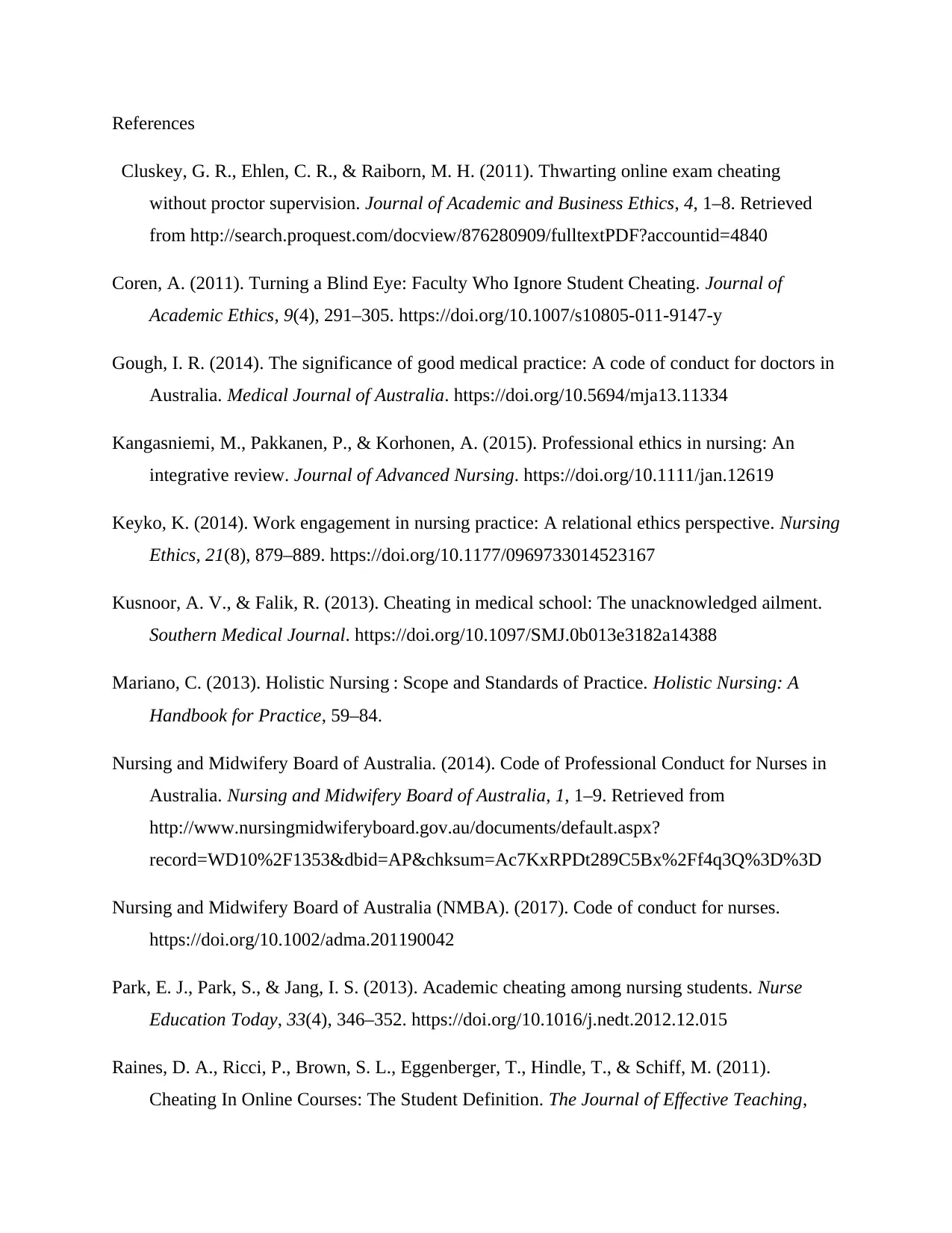
References
Cluskey, G. R., Ehlen, C. R., & Raiborn, M. H. (2011). Thwarting online exam cheating
without proctor supervision. Journal of Academic and Business Ethics, 4, 1–8. Retrieved
from http://search.proquest.com/docview/876280909/fulltextPDF?accountid=4840
Coren, A. (2011). Turning a Blind Eye: Faculty Who Ignore Student Cheating. Journal of
Academic Ethics, 9(4), 291–305. https://doi.org/10.1007/s10805-011-9147-y
Gough, I. R. (2014). The significance of good medical practice: A code of conduct for doctors in
Australia. Medical Journal of Australia. https://doi.org/10.5694/mja13.11334
Kangasniemi, M., Pakkanen, P., & Korhonen, A. (2015). Professional ethics in nursing: An
integrative review. Journal of Advanced Nursing. https://doi.org/10.1111/jan.12619
Keyko, K. (2014). Work engagement in nursing practice: A relational ethics perspective. Nursing
Ethics, 21(8), 879–889. https://doi.org/10.1177/0969733014523167
Kusnoor, A. V., & Falik, R. (2013). Cheating in medical school: The unacknowledged ailment.
Southern Medical Journal. https://doi.org/10.1097/SMJ.0b013e3182a14388
Mariano, C. (2013). Holistic Nursing : Scope and Standards of Practice. Holistic Nursing: A
Handbook for Practice, 59–84.
Nursing and Midwifery Board of Australia. (2014). Code of Professional Conduct for Nurses in
Australia. Nursing and Midwifery Board of Australia, 1, 1–9. Retrieved from
http://www.nursingmidwiferyboard.gov.au/documents/default.aspx?
record=WD10%2F1353&dbid=AP&chksum=Ac7KxRPDt289C5Bx%2Ff4q3Q%3D%3D
Nursing and Midwifery Board of Australia (NMBA). (2017). Code of conduct for nurses.
https://doi.org/10.1002/adma.201190042
Park, E. J., Park, S., & Jang, I. S. (2013). Academic cheating among nursing students. Nurse
Education Today, 33(4), 346–352. https://doi.org/10.1016/j.nedt.2012.12.015
Raines, D. A., Ricci, P., Brown, S. L., Eggenberger, T., Hindle, T., & Schiff, M. (2011).
Cheating In Online Courses: The Student Definition. The Journal of Effective Teaching,
Cluskey, G. R., Ehlen, C. R., & Raiborn, M. H. (2011). Thwarting online exam cheating
without proctor supervision. Journal of Academic and Business Ethics, 4, 1–8. Retrieved
from http://search.proquest.com/docview/876280909/fulltextPDF?accountid=4840
Coren, A. (2011). Turning a Blind Eye: Faculty Who Ignore Student Cheating. Journal of
Academic Ethics, 9(4), 291–305. https://doi.org/10.1007/s10805-011-9147-y
Gough, I. R. (2014). The significance of good medical practice: A code of conduct for doctors in
Australia. Medical Journal of Australia. https://doi.org/10.5694/mja13.11334
Kangasniemi, M., Pakkanen, P., & Korhonen, A. (2015). Professional ethics in nursing: An
integrative review. Journal of Advanced Nursing. https://doi.org/10.1111/jan.12619
Keyko, K. (2014). Work engagement in nursing practice: A relational ethics perspective. Nursing
Ethics, 21(8), 879–889. https://doi.org/10.1177/0969733014523167
Kusnoor, A. V., & Falik, R. (2013). Cheating in medical school: The unacknowledged ailment.
Southern Medical Journal. https://doi.org/10.1097/SMJ.0b013e3182a14388
Mariano, C. (2013). Holistic Nursing : Scope and Standards of Practice. Holistic Nursing: A
Handbook for Practice, 59–84.
Nursing and Midwifery Board of Australia. (2014). Code of Professional Conduct for Nurses in
Australia. Nursing and Midwifery Board of Australia, 1, 1–9. Retrieved from
http://www.nursingmidwiferyboard.gov.au/documents/default.aspx?
record=WD10%2F1353&dbid=AP&chksum=Ac7KxRPDt289C5Bx%2Ff4q3Q%3D%3D
Nursing and Midwifery Board of Australia (NMBA). (2017). Code of conduct for nurses.
https://doi.org/10.1002/adma.201190042
Park, E. J., Park, S., & Jang, I. S. (2013). Academic cheating among nursing students. Nurse
Education Today, 33(4), 346–352. https://doi.org/10.1016/j.nedt.2012.12.015
Raines, D. A., Ricci, P., Brown, S. L., Eggenberger, T., Hindle, T., & Schiff, M. (2011).
Cheating In Online Courses: The Student Definition. The Journal of Effective Teaching,
Paraphrase This Document
Need a fresh take? Get an instant paraphrase of this document with our AI Paraphraser
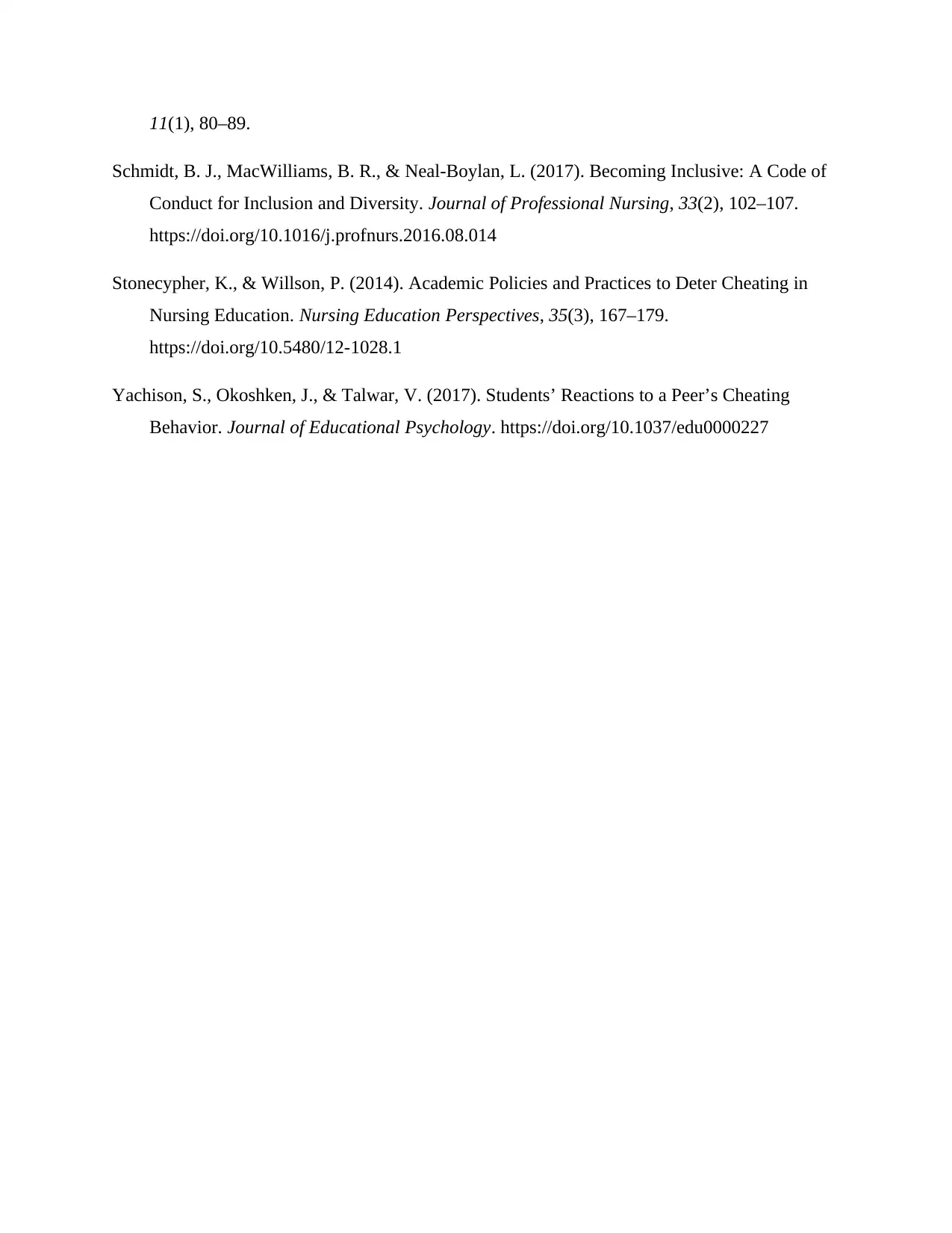
11(1), 80–89.
Schmidt, B. J., MacWilliams, B. R., & Neal-Boylan, L. (2017). Becoming Inclusive: A Code of
Conduct for Inclusion and Diversity. Journal of Professional Nursing, 33(2), 102–107.
https://doi.org/10.1016/j.profnurs.2016.08.014
Stonecypher, K., & Willson, P. (2014). Academic Policies and Practices to Deter Cheating in
Nursing Education. Nursing Education Perspectives, 35(3), 167–179.
https://doi.org/10.5480/12-1028.1
Yachison, S., Okoshken, J., & Talwar, V. (2017). Students’ Reactions to a Peer’s Cheating
Behavior. Journal of Educational Psychology. https://doi.org/10.1037/edu0000227
Schmidt, B. J., MacWilliams, B. R., & Neal-Boylan, L. (2017). Becoming Inclusive: A Code of
Conduct for Inclusion and Diversity. Journal of Professional Nursing, 33(2), 102–107.
https://doi.org/10.1016/j.profnurs.2016.08.014
Stonecypher, K., & Willson, P. (2014). Academic Policies and Practices to Deter Cheating in
Nursing Education. Nursing Education Perspectives, 35(3), 167–179.
https://doi.org/10.5480/12-1028.1
Yachison, S., Okoshken, J., & Talwar, V. (2017). Students’ Reactions to a Peer’s Cheating
Behavior. Journal of Educational Psychology. https://doi.org/10.1037/edu0000227
1 out of 8
Related Documents
Your All-in-One AI-Powered Toolkit for Academic Success.
+13062052269
info@desklib.com
Available 24*7 on WhatsApp / Email
![[object Object]](/_next/static/media/star-bottom.7253800d.svg)
Unlock your academic potential
Copyright © 2020–2026 A2Z Services. All Rights Reserved. Developed and managed by ZUCOL.





